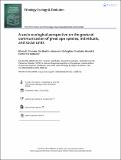A socio-ecological perspective on the gestural communication of great ape species, individuals, and social units
Date
2022Metadata
Show full item recordAbstract
Over the last 30 years, most research on non-human primate gestural communication has been produced by psychologists, which has shaped the questions asked and the methods used. These researchers have drawn on concepts from philosophy, linguistics, anthropology, and ethology, but despite these broad influences the field has neglected to situate gestures into the socio-ecological context in which the diverse species, individuals, and social-units exist. In this review, we present current knowledge about great ape gestural communication in terms of repertoires, meanings, and development. We fold this into a conversation about variation in other types of ape social behaviour to identify areas for future research on variation in gestural communication. Given the large variation in socio-ecological factors across species and social-units (and the individuals within these groups), we may expect to find different preferences for specific gesture types; different needs for communicating specific meanings; and different rates of encountering specific contexts. New tools, such as machine-learning based automated movement tracking, may allow us to uncover potential variation in the speed and form of gesture actions or parts of gesture actions. New multi-group multi-generational datasets provide the opportunity to apply analyses, such as Bayesian modelling, which allows us to examine these rich behavioural landscapes. Together, by expanding our questions and our methods, researchers may finally be able to study great ape gestures from the perspective of the apes themselves and explore what this gestural communication system reveals about apes’ thinking and experience of their world.
Citation
Graham , K , Badihi , G , Safryghin , A , Grund , C & Hobaiter , C 2022 , ' A socio-ecological perspective on the gestural communication of great ape species, individuals, and social units ' , Ethology Ecology & Evolution , vol. 34 , no. 3 , pp. 235-259 . https://doi.org/10.1080/03949370.2021.1988722
Publication
Ethology Ecology & Evolution
Status
Peer reviewed
ISSN
0394-9370Type
Journal item
Collections
Items in the St Andrews Research Repository are protected by copyright, with all rights reserved, unless otherwise indicated.

